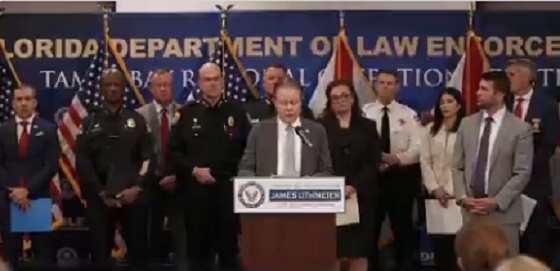Health
Trump’s surgeon general pick is a threat to Big Pharma, not medical freedom

From LifeSiteNews
By John Leake
Dr. Casey Means has faced backlash for spotlighting America’s metabolic crisis and pushing for reform of junk food production and marketing instead of the hyper-vaccination problem.
“You are what you eat,” as the old saying goes.
Anyone who visits a U.S. airport and looks around can see that something has gone terribly wrong with the metabolic health of the American people. It’s therefore an astonishing fact that President Donald Trump’s new pick for Surgeon General, Casey Means, has come under fire from all quarters for suggesting that there is something wrong with our food supply that needs to be investigated and corrected.
I get it, it’s up to the individual to avoid eating junk food. Nevertheless, it is still perfectly sensible public policy to ascertain how the American food industry deliberately engineers and encourages the consumption of junk food, especially among the young.
A thorough investigation of the American food industry could also yield sensible strategies for investing in higher quality food production. This, in turn, could revitalize America’s moribund agricultural sector. There’s a lot of talk of “bringing jobs back to America.” How about jobs producing high quality food in local markets all over the country?
I am aware of the suspicion within the medical freedom movement that Casey Means is controlled opposition for changing the subject from the real enemy of public health – namely, the hyper-vaccination of children, which is doing Lord knows what to their gastrointestinal, neurological, and metabolic health.
Though I appreciate the fact that the Vaccine-Industrial Complex is skilled at changing the subject to divert critical scrutiny away from vaccines, I have not seen any evidence that Casey Means is serving the Vaccine Cartel with her stated objective of scrutinizing the food supply.
Some of my readers have pointed out that Casey’s father, Grady Means, worked in President Gerald Ford’s administration as an assistant to Vice President Nelson Rockefeller, and that this should be regarded as evidence that she is serving undeclared interests. One should remember that it was the Ford Administration that quickly pulled the Swine Flu vaccine off the market after reports that about 25 people had died after receiving the shots and a few hundred developed Guillain-Barre.
Moreover, the fact that one’s family has worked for U.S. government institutions is not evidence that one is compromised by nefarious interests. A notable example of this was young Tyler Shultz, who blew the whistle on Theranos, even though his grandfather – former Secretary of State George Shultz – was an investor in the bogus blood testing company and was extremely unhappy about his grandson’s decision.
Secretary Kennedy supports her, and he has done more than anyone in the public forum to raise concern about vaccine safety.
People frequently ask me why Secretary Kennedy isn’t working faster to counter the unwarranted influence of Vaccine-Industrial Complex. This strikes me as the equivalent of complaining that Indiana Jones didn’t escape from the Well of Souls fast enough.
Secretary Kennedy has entered one of the largest dens of venomous serpents ever erected. It’s going to take him a while to slash through it.
Reprinted with permission from Focal Points.
Health
Red Deer Hospital Lottery 2025 Winners

The Red Deer Regional Health Foundation is thrilled to announce the winners of this year’s Red Deer Hospital Lottery prizes – including the Dream Home, a $100,000.00 cash prize, and Mega Bucks 50.
James Smith of Spruce View has won the $100,000.00 cash prize.
Montey Brehaut of Red Deer has won the Mega Bucks 50 jackpot, taking home $301,702.50.
The grand prize Sorento Custom Homes Dream Home, including furnishings by Urban Barn and worth $1,074,472 – has been awarded to Oscar Gunnlaugson of Sylvan Lake.
The winner announcements took place at noon on June 26 , 2025 – and was streamed live on Facebook from Red Deer Regional Hospital Center.
“We’re excited to celebrate this year’s winners and deeply grateful to everyone who supported the lottery,” said Manon Therriault, CEO of the Red Deer Regional Health Foundation. “Funds raised will directly enhance patient care at Red Deer Regional Hospital Centre.”
This year’s lottery proceeds will fund essential new and replacement equipment, ensuring Red Deer Regional Hospital Center can continue to serve the 500,000 people who rely on it. While plans for the hospital expansion move forward, healthcare doesn’t wait. Patients in our community need access
to life-saving technology today, and supporting Red Deer Hospital Lottery has made that possible.
A full list of winners, including electronics prize recipients, will be posted on July 2 at reddeerhospitallottery.ca.
Winners will also receive instructions on how to claim their prizes by mail.
The keys to the Dream Home will be presented at a special ceremony this summer.
Health
‘Transgender’ males have 51% higher death rate than general population: study

From LifeSiteNews
Research found that men who underwent a ‘gender transition’ using hormones have a 51% higher mortality rate than the general population and a ‘threefold’ greater risk of cardiovascular deaths.
A newly published study has found that males’ use of estrogen to present as “female” triples their risk of cardiovascular disease, while also heightening the risk of stroke, blood clots, depression, and cognitive impairment.
The journal Discover Mental Health on June 12 released a variety of findings regarding the negative impacts of estrogen use in males attempting to transition to “female.” One of the most significant was that current estrogen use “was associated with a threefold increased risk of death from cardiovascular events.”
In fact, a study of 966 “female transitioned” males were found to have a mortality rate 51 percent higher than that of the general population. Their main causes of death included cardiovascular disease (21 percent), cancer (32 percent), suicide (7.5 percent), and infection-related disease (five percent).
Estrogen use by males amplified other cardiovascular risks, especially with prolonged use. One meta-analysis found a 30 percent higher rate of stroke among gender-confused men who took estrogen compared with men who did not.
A review also found “strong evidence” that estrogen use by men increases their risk for vein blood clots “over fivefold.”
Estrogen use was also found to have a detrimental cognitive impact on men. For example, so-called “female transitioned” males were found to have lower scores than both their other male counterparts and women in “information-processing speed and episodic memory.”
In addition, elevated symptoms of depression were “associated with increased serum levels of estradiol” for men under the age of 60.
This recent study confirms 2023 study that found that all gender-confused individuals, whether men attempting to present themselves as women or women attempting to present themselves as men, were at significantly increased risk for a range of deadly cardiovascular conditions, including strokes, heart attacks, high blood pressure, and elevated cholesterol levels.
A 2019 study published by the National Institutes of Health (NIH) National Library of Medicine also found:
Cardiovascular disease (CVD) is the leading disease-specific cause of death for [so-called] transgender people undergoing [transgender procedures], with only suicide claiming more lives as the leader of all cause mortality.
However, for [gender-confused males], the risk of death from CVD is 3-fold higher than for all other groups.
Research reported by both the British Heart Association and the American Heart Association that same year arrived at similar findings:
“We already know sex hormones are important to cardiovascular health, and now we have people being exposed to high levels of sex hormones they normally would not have, which could be associated with cardiovascular benefit or risk,” said Dr. Christian Delles, a professor at the Institute of Cardiovascular and Medical Sciences at the University of Glasgow.
-

 Bruce Dowbiggin9 hours ago
Bruce Dowbiggin9 hours agoWhat Connor Should Say To Oilers: It’s Not You. It’s Me.
-

 Business10 hours ago
Business10 hours agoFederal fiscal anchor gives appearance of prudence, fails to back it up
-

 Business8 hours ago
Business8 hours agoThe Passage of Bill C-5 Leaves the Conventional Energy Sector With as Many Questions as Answers
-

 Alberta6 hours ago
Alberta6 hours agoAlberta poll shows strong resistance to pornographic material in school libraries
-

 Crime5 hours ago
Crime5 hours agoFlorida rescues 60 missing kids in nation’s largest-ever operation
-

 Business4 hours ago
Business4 hours agoCanada should already be an economic superpower. Why is Canada not doing better?
-

 Banks7 hours ago
Banks7 hours agoScrapping net-zero commitments step in right direction for Canadian Pension Plan
-

 Business2 days ago
Business2 days agoBehind the latest CPI Numbers: Inflation Slows, But Living Costs Don’t



